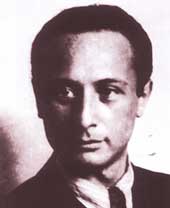|
|
| Survivor’s tale |
The Pianist
By Wladyslaw Szpilman,
Phoenix, £ 3
Wladyslaw Szpilman was by profession what in Poland is called “a man in whom music lives”: a pianist and composer who had always been an inspiration and a significant figure in Polish cultural life. In the Berlin Academy of Arts, he studied the piano with none other than Arthur Schnabel and composition with Arthur Schreker. Hitler’s rise to power saw him back in Warsaw working as a pianist for Polish Radio. Before the war he accompanied some of the leading violinists. After the war he came back to his job and to concert performances.
This is the story of Szpilman’s war spent in Warsaw, a story of survival against all possible odds. The book is written with supreme but melancholy detachment as it reflects on experiences that were shattering. By writing this account, immediately after the war in a devastated Warsaw, he probably wanted to rid himself of certain emotions and memories. But liberation from the Nazis did not really mean freedom. When this book first appeared in Poland in 1946, it was withdrawn from circulation by Stalin’s Polish hatchetmen.
Of the three and half million Jews who lived in Poland, only 245,000 survived the Holocaust. These were the odds against Szpilman’s survival. He survived in the ghetto and was part of the Polish resistance. He was among those who were taken out daily in a labour column to the “Aryan” side of the city. From there he would bring back, at the risk of his own life, food and ammunition into the ghetto.
Like most brave men, he had the favour of good fortune. He had been separated from his family when they were about to board the train that would take them to the death camp. He had been pulled away from the crowd by an unknown man. Thus his wanderings began. He was first given shelter by a Jewish policeman, a collaborator, who had known the family. At the end an old German Wehrmacht officer, Wilm Hosenfeld, saved him. Szpilman was half dead by then and Warsaw empty of its citizens. Hosenfeld brought him food, an eiderdown and an overcoat. Ironically, Hosenfeld himself would die in a prisoner of war camp in the Soviet Union. His Soviet captors tortured him because they could not believe he had actually saved the life of a Jew. Szpilman, when he got to know the plight of the man who had saved him, tried to get Hosenfeld out of the Soviet Union but the Russians refused.
This book is a chilling account of what man can do to man, both good and bad, both noble and degrading. Hosenfeld’s act stands against the destruction of the Warsaw ghetto and the complete devastation of an old and splendid city. The violence and the humiliation that Szpilman experienced and witnessed stands in contrast to the beauty of his piano playing, his rendering of Chopin which captivated audiences. Against the darkness of death all around, this is a remarkably vivid and anguished account of a man’s survival.
There is hope in the book. Hope articulated in the very way Szpilman played to post-war Polish children “who do not know how much human suffering and mortal fear once passed through their sunny schoolrooms.” “I pray,” Szpilman writes, “they may never learn what such fear and suffering are.”











